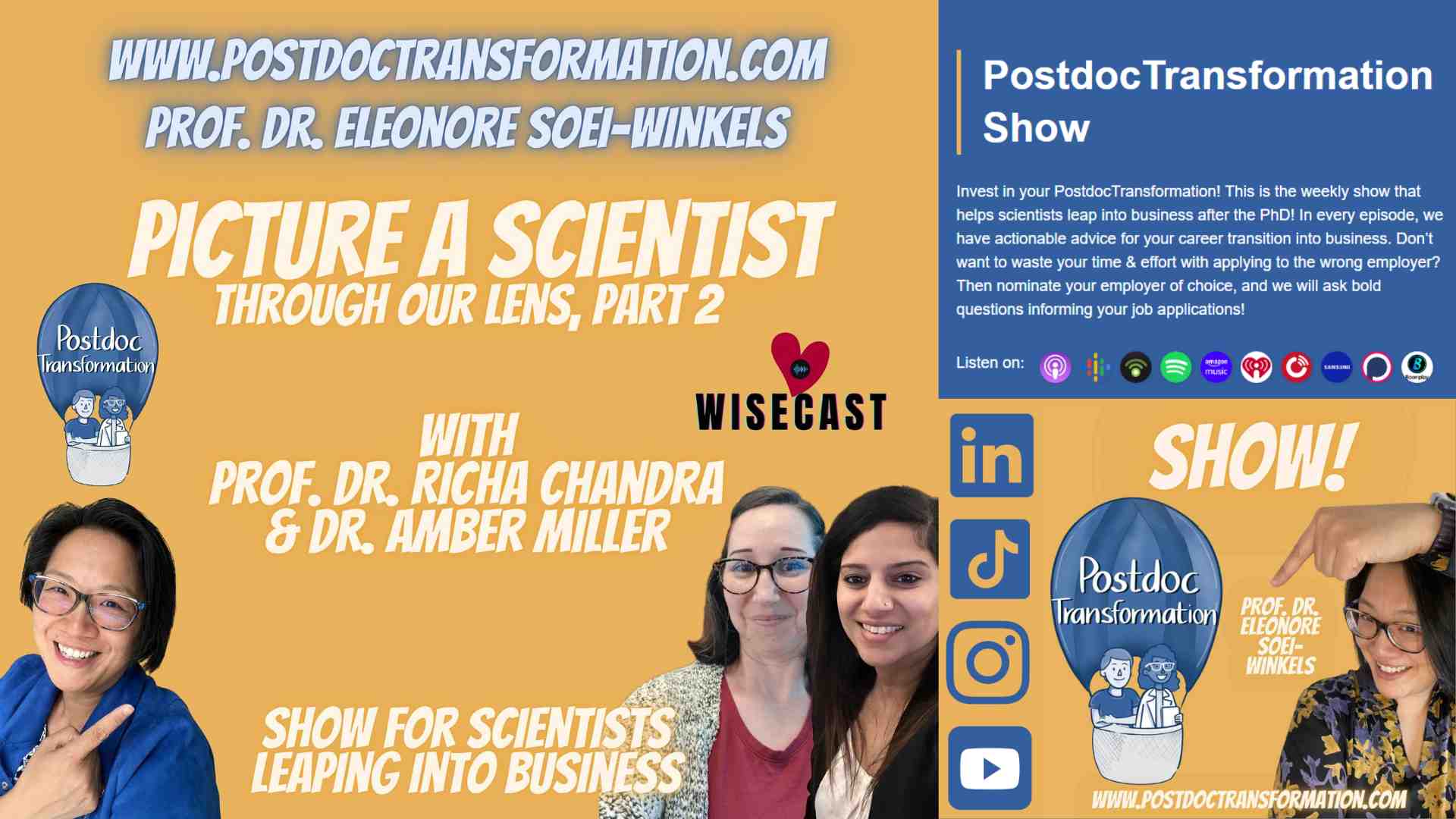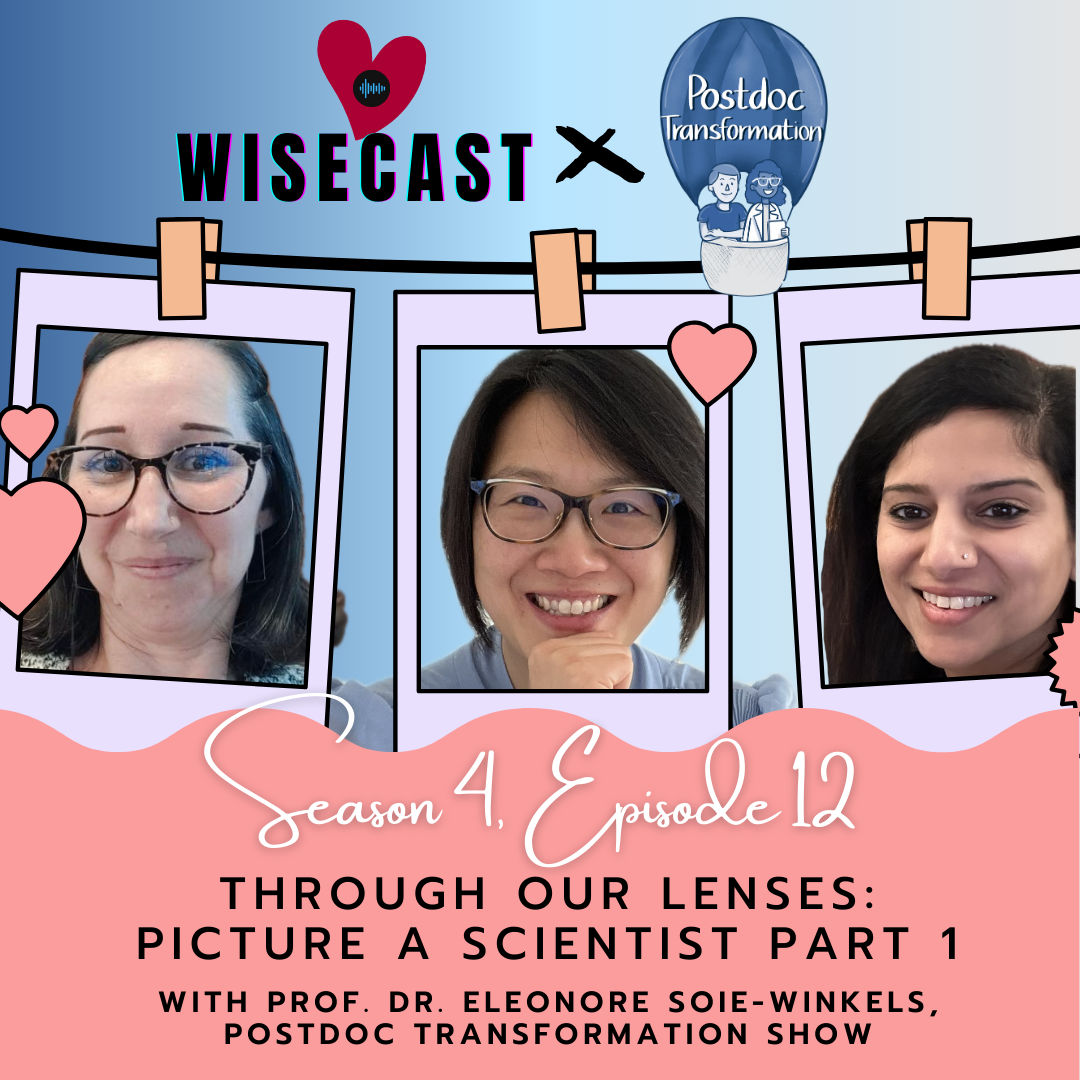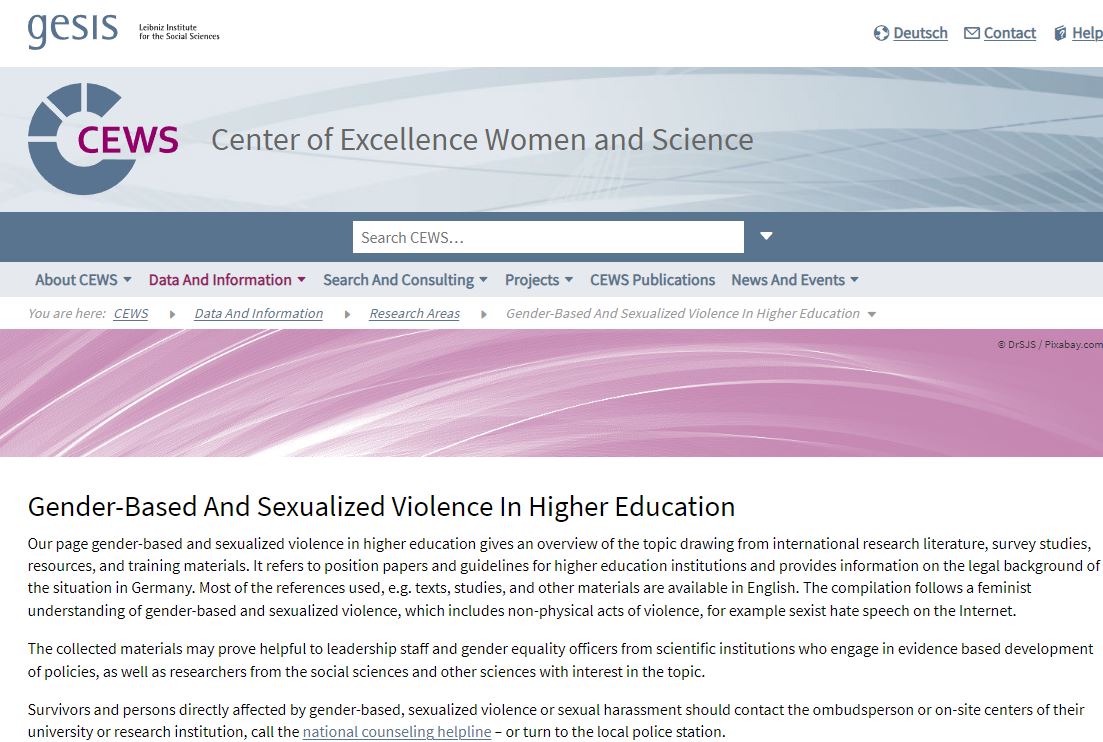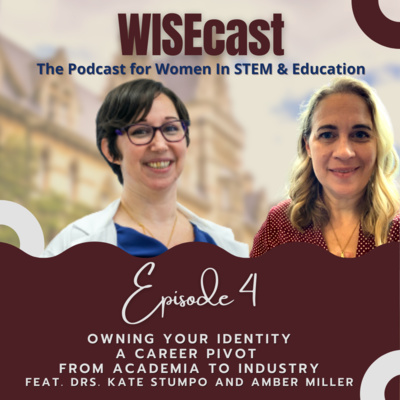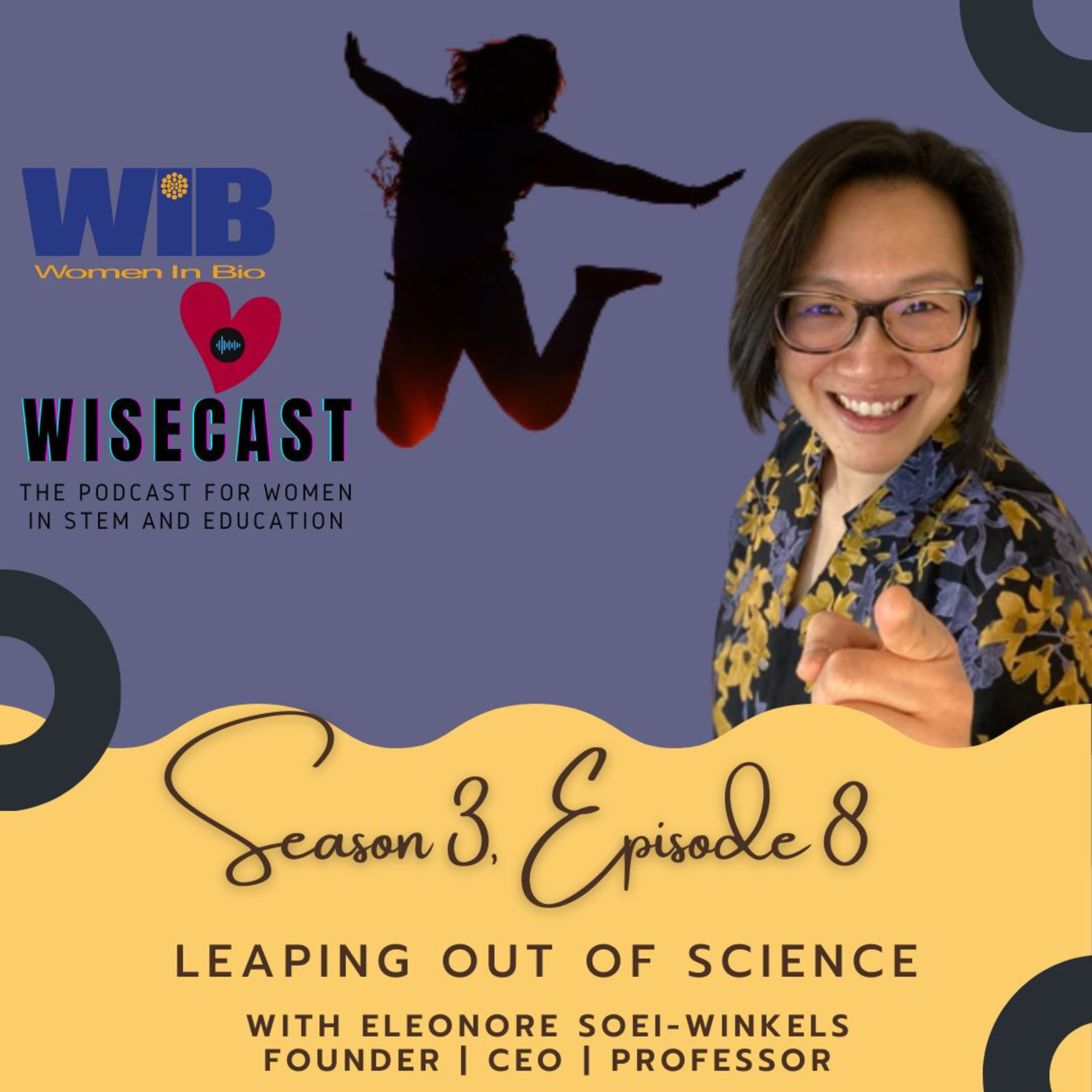Picture a scientist, through our lens, part 2 with Prof. Dr. Richa Chandra and Dr. Amber Miller from WISEcast
In this PostdocTransformation Show episode, Prof. Dr. Richa Chandra & Dr. Amber Miller from WISEcast talk with Prof. Dr. Eleonore Soei-Winkels about the challenges faced by women in STEM, particularly in academia, focusing on microaggressions, intersectionality, and barriers to career progression. They highlights the importance of empowering women and daughters, advocating for diversity in hiring practices, and transitioning into business. The conversation delves into the impact of biases, the need for inclusivity, and efforts to create a more equitable environment in STEM fields.
Find their Instagram here: https://www.instagram.com/thewisestwomenpodcast/
Subscribe to their Podcast WISEcast here.
Subscribe to our weekly show on your favorite podcast platforms: Why? Postdoc scientists & PhD students / candidates will learn the basics for their career transition from research into business & industries AND will get to know a company that hires early career scientists!
About our PostdocTransformation show
Invest in your PostdocTransformation. Welcome to the seasonal show for scientists leaping into business. In every sponsored episode, we are happy to recommend employers of choice for you. Make sure to check your readiness to leap out of science with us for free, as linked in the show notes. For your career transition, we offer customized career transition e-courses and memberships, also at graduate schools all over the world.
Maybe yours too. And if your university isn't yet our customer, enroll in your free email course for career transition made simple as linked in the show notes. I'm your host, Professor Dr. Eleonore Soei Winkels, with my team who is rooting for you. And let's build your PostdocTransformation with this episode.
[00:01:02] Collaboration with WISEcast and the Importance of Listening to Part One
Eleonore: Welcome, PostdocTransformers. This is a very special episode because I'm collaborating now with WISEcast, hosted by the wisest women, Prof. Dr. Richa Chandra and Dr. Amber Miller. And you are now listening to the second part of our conversation around picture a scientist, which means that if you haven't listened yet to the first part in their WISECast podcast, then click on this link below.
That takes you directly to their first episode of Picture a Scientist, our conversation. And then after that, I hope that you will be coming back to the PostdocTransformation Show for the second part of this conversation.
Now, I assume you have already listened to our first part in WISEcast.
[00:01:45] The Impact of WISEcast and the Inspiration Behind PostdocTransformation Show
Eleonore: Why am I so happy to be here collaborating with WISEcast? Well, WISEcast is the podcast for women in STEM in education and is hosted by the wisest women, Dr. Richa Chandra and Dr. Amber Miller.
Dr. Richa Chandra is a tenured associate professor, Chair of chemistry at the University of St. Thomas in Houston, Texas, US.
And Dr. Amber Miller is a research scientist at Bethyl Laboratories in Montgomery, Texas, US.
WISEcast, The Wisest Women, is an organization bringing equity and STEM by empowering women through real conversations and they bring awareness to the challenges women face in STEM and education.
(I'm opening brackets here. I really do think that they also speak especially to moms and people of color, because it's not just a gender thing, it's intersectional.)
To turn these challenges into opportunities, they inspire others to find their place in STEM, build their tribe by making meaningful connections, and develop their voice to lift others and break down barriers. And that really speaks to my heart.
Their first episode aired in October 2020 and, we all know how COVID 19 impacted the world.
I discovered their WISEcast only in 2022 and found the conversations relatable, honest, and capturing the zeitgeist, the emotions and thoughts from the point of view of women scientists with care work responsibilities on their way to become professors or leaping into industries.
Being an underrepresented professor myself, as a woman, Asian in Germany, and also a mom, in every episode, I have the feeling of eavesdropping two role models in academia sharing valuable insights and validating my experiences in a very vulnerable way. They are really the girlfriends in academia you want to be around.
So, according to Feedspot, they rank 13th among the 60 best women in STEM podcasts. So it's not just me celebrating WISEcast and that's why I'm sharing this with you.
I've been working hard to get their attention and to be invited into WISEcast
and I will link to our episode, Leaping Out of Science, from November 22 in the show notes.
That really was an epiphany moment for me and they inspired me to create my own podcast, the PostdocTransformation Show for Scientists Leaping into business. So, if you are grateful for this show, you really have to thank Richa and Amber for inspiring me to do so.
Eleonore: So, drum roll, without further ado, here's the second part of our conversation reviewing Picture Scientist, a movie about prominent women in science who endured and coped with systemic and intersectionally compounding obstacles during their career. This really is a must watch recommendation.
Dr. Richa Chandra: We just think it's okay. Or it felt okay back then, but now I would feel so awkward in a boys club kind of situation. Yeah, what you were describing reminded me, there was a lot more of that in chemistry, I feel like, than what you might've gone through at BCM. So yeah, all of that's just kind of coming back and I'm just kind of processing it.
[00:05:04] Personal Experiences and the Importance of Awareness in Academia
Dr. Richa Chandra: Elli, what do you think?
Eleonore: Yeah, I studied psychology. So that is women dominated, at least from the students. But at the end of the day, the faculty is all male. So, when I studied psychology as an undergraduate, there was only one postdoc female and the rest of them, the whole faculty from postdoc upwards was men.
And I remember one of the very old professors to be called the Italian stallion, because he obviously always tried to hit on the women students. Never was sexually harassed like that. At least I wouldn't call it like this. But when I watched the movie, then in hindsight, maybe it could have been, but it wasn't at that time.
I felt ashamed. I felt stupid. I was like, hopefully no one knows, but I sexual harassment, it was not the word that I had in mind.
What I would try to have with my daughter is once she enters high school, university, if she wants to enter, then to have a discussion on what are things that could be interpreted differently, that would not occur to her brother.
That I don't want her brother to do. I don't want anyone to do to her. To him and whatever. So I think that this openness of you've been through things, you've seen things and you want to pass that on to the next generation. So, the next generation is at least alerted and knows how to behave differently and to sort of like indicate that it's wrong.
And it doesn't take, I don't know how many years for, you know, Dr. Jane Willenbring to bring that up just because her daughter says that she wants to step into her footsteps.
So, I mean, how many women did not have gotten help since then?
And once you have determined your readiness to leap and want to transition into business or industries, then you can enroll in your free email course with 10 actionable, bingeable email lessons until you start your job in business. You'll get 10 emails like this at zero cost.
1) How to leap out of science.
2) How to build your sustainable LinkedIn profile.
3) How to read social media and network.
4) How to research your favorite jobs and employers.
5) How to do information interviews to get insights.
6) How to create your customized applications with ChatGPT.
7) How to prepare your thesis from a business point of view.
8) How to apply to your favorite employers.
9) How to choose the right job offer.
10) How to prepare for your new job
Enroll now for free.
[00:07:02] Addressing Sexual Harassment and Gender Bias in STEM
Eleonore: I really do think that It is everywhere in the male dominated industries. groups or whatever. It's also in business, but I would say that I was working at Accenture. I was working for different companies, the bigger companies, and they all have a sexual harassment line. So, they had information from HR. So, in preparation for our interview, now I research a little bit.
And there is actually a site for a German scientists who can say that there is something like that. I was never informed about that.
Dr. Richa Chandra: Yeah. I I was surprised.
Eleonore: I mean, I'm a professor. I should have known. I've been in academia for many years, but I didn't see this. And I will put that down in the show notes as a link so that everyone who is listening from Germany at least knows it does happen. You're not the first.
Maybe you are lucky, if nothing bad happened, but it's those microaggressions that knack on your competency. I'm really wondering how many of the PostdocTransformers who want to leap into industries are actually leaping because they have been fallen victim because of that.
They're maybe going away from academia because of that.
[00:08:18] The Future of Work: Shifting from Academia to Industry for a Safer Environment
Eleonore: I'm emphasizing the future of work is not in academia, but instead it's there and there and there. I'm helping them to look forward. But maybe I have closed my eyes in the sense of what is deterring them away from academia.
So, that really is an important episode for me to think about future content so that maybe I need to dovetail that into future content as well.
[00:09:41] Understanding Microaggressions and the Struggle for Equity in STEM
Dr. Richa Chandra: And if we just kind of list some of the things from the documentary that were considered these microaggressions, the stuff that's under the iceberg or a submersion water, so things that they brought up, mistaken for a custodian, ignored in meetings, Inappropriate emails, treated like a technician, not getting credit. I'm looking at you, Amber, questioning competence and family leave stigma. Oh gosh. And that just, when I was watching that, I was telling Amber yesterday, I got emotional towards the end of the movie because I think that, I mean, I'm guilty of like maybe suppressing, minimizing individual events. And it's what Jane said, in the documentary, like time would pass. It's not like continuously these things happen, right? Like, so you might have days between or years or months between these things, but they chip away at you. They take up space, time, away from you being able to be productive in your career and really just kind of the privilege that Our male counterparts have where they can just, not even think about those things or deal with those things.
I have been accosted when I started off in my career, partially because I look young, and petite, , like what are you doing in here in the faculty lounge? Like, you know, making copies of my exam, right? I'm like, I'm faculty, you know, just because picture a scientist, I may not look like it at that stage.
But yeah. Amber, you were saying that you weren't sure if you were feeling what? Optimistic or just kind of, you know, downtrodden about
Dr. Amber Miller: Yeah, I mean, and to circle back, like, I think it was Dr Burks who was talking about her email, basically the time it takes her to respond to emails to make sure she has appropriately crafted the email and so that it's not too assertive, right? Or she'll come off as angry and all of these things.
And I thought, I do I to this day, still take so much time when I craft my emails and before I think I took a lot of time and now I'm taking a lot of time to almost undo some of the stuff that I have ingrained to minimize my ask, right? Like I just wanted to know, I just wanted to follow up.
Like, no, I don't need to put the just in there anymore. I wanted to follow up with you to check in on X and Y, so what is professional? What's going to come across as unprofessional? What's going to come across? Like, I don't know what I'm talking about. What's going to come across as I'm not being collaborative or when should I use we, and when should I put i, and when should I, you do all these things and, you know, it takes, it takes me a long time for some of the emails that I have to write when it's going to different sorts of people or my boss's boss's boss. Right. And, and it's just, when you think about adding up. Every time I sit down to write one of those emails and even to a colleague and even to, you know, whoever it's incredible, right?
And in terms of, it doesn't seem like a big deal, but I could be doing so much more than just that email and the amount of time it takes me to craft a single email.
Hey, PostdocTransformer, are you curious to ask professors, principal investigators, visiting scientists, postdocs, PhD students, and candidates some in depth life and career guiding questions? But it feels cringe, so you end up not asking ...
Buy our [00:05:00] PostdocTransformation Card Game to have more fun and valuable insights in your journal club, lab, and mentoring meetings, lab rotations, during conferences, panels, and breaks at the Mensa.
In the first set of 40 cards you'll get 10 intriguing mentoring questions per career level. 10 for PhD students, 10 for postdocs and 10 for professors.
We have a second set for parents, scientists, underprivileged and underrepresented and underserved scientists. Buy the card sets with our 25 % discount code "Show" (just enter "Show" during the Shopify checkout).
[00:12:50] Promoting Inclusivity and Understanding Through Conversation
Dr. Amber Miller: And I also yesterday, too, on LinkedIn, saw this LinkedIn post about it was almost like a little cartoon that said, if you don't understand privilege and on one side of the picture, it had someone running like hurdles, right?
And it was just, it was a guy, of course, like on the side, his path was straight and he had maybe three or four hurdles, right? On the other side, it was a woman and she had barbed wire. She had alligators. Hers was hilly, like she had all of this stuff that was in her way. And the comment was like, well, it's the same distance. Yeah. And you're just like, uh, sure. But like, obviously you just look at it and you know, one of these is an uphill battle, literally, right? Like versus like, maybe I have to jump over or go eat. And I think the hurdles were even kind of like offset. So he didn't even have to go over the hurdles. He could have just like kind of ran around them. I think now some of these concepts are talked about more of these graphics that are so like, easy to understand and to visualize and see the concepts of equity versus equality versus justice kind of things.
Where it's the apple tree, and it's like, okay, so you both need ladders. You have the same size ladders, but on one side of the tree, the limb is higher up than the other side of the tree. So even with the same size ladder, they can't even reach the apples to pick. So then
it's equal, right? You both have the same ladder, like, you should be fine. Right? But it's not equality, right? It's not equity. It's not giving them the same access to be able to do the same things. And so I think a lot of these conversations are being talked about it.
And, you know, these, these diagrams and cartoons that are so easy to understand the concepts and the nuances between the different terms and what they actually mean is so important, but yeah, I finished the movie and I said, I don't know if I'm feeling empowered or more discouraged. And part of that is because, sure, things are getting better, we just had equal payday, whatever, the middle of March, right? Like, it's getting better. Now it's the middle of March instead of the end of the March, but it's not moving fast enough. Like, that line where the MIT faculty was the same for 50 years, right?
And now, okay. I saw, and this is me being cynical now, like, well, the next year after this committee, they hired 50 percent more women. And I said, so 50 percent of the 15. So now we have 20, you know, 25 women compared to 149. Like, what does this 50, like, we can say we hired 50 percent more women, but was it 50 percent of the 17?
You're like, what does that number actually mean? Is there now 50 women to the 150? Is it 149 to a hundred? Like what? What is the actual representation? Sure. We hired more now. We should feel good about ourselves, but it's still like nowhere close to like what it should be. Right.
Dr. Amber Miller: And that doesn't even take into account all of the different.
Like, caveats for people of color, right? In general, at these prestigious universities, we're just taking away now, right? Like, now at federally funded places, you can't even talk about all the different diversity. You can't use the word diversity at some state institutions, but federally, you have to talk about diversity to get funding.
So, the fact that now there are these different laws, Texas is an interesting place to be when it comes to some of these things. And I don't know how much of this we can actually talk about, but it's just like, I feel like some of this stuff is going backwards, even though we're making progress and these things we realize are important.
That's, I think why I feel like sure, we've come a long way and I'm very proud to be where we are and the people who have laid the groundwork. Behind us so that we could, I could even get my PhD, right? Like that was a thing that wasn't a big hurdle to jump through in terms of even just getting into the program and finding a spot, like the whole process is a hurdle for everyone.
That's like a whole nother story. But, but those things were already, you know, I wasn't the first one to do these things. But at the same time, it's still a quarter of women are professionals in STEM fields, right? Like, why is it just that many? And so I feel like sure we're making progress, but it doesn't feel at their rate that we should be making progress.
And now I feel like laws are changing to undo some of the progress. And it's just, I don't know. And then I think, are we making a difference? And I think we are, we're doing our part. We are making a difference, but it just is like, I don't know. I think that's why I feel defeated because it feels like it should be better.
Right? Then it is. I don't know.
Dr. Richa Chandra: And I think you're right. 'cause it was Nancy Hopkins who brought that up too, that if she had to do it all over again, would she? We're activists too, all three of us, we speak about women in STEM, and all the obstacles that we face, and we try to empower women. Look how much time it takes up from our jobs. I have an annual faculty evaluation due. I'm sure my male colleagues are done, but I'm being an activist also. So watching the documentary, I'm taking time away from just having that smooth climb or that distance that you're talking about in that graphic and I feel this social responsibility to do this. So I brought this up to my student group, we were at the ACS conference the last few days and, you know, the male students didn't get it, that there's this leaky pipeline problem for women.
And one of the students said, wait, I heard that there were more women , in college now. So that's the stat that, he landed on, like, you know, how, how is this a problem then, right. For women and I was, and then all the girls, mind you, there are just 20 somethings, right. So, but they, they're, you know, the couple of generations below us and still They are experiencing all of the stuff too, right?
So they feel that in the classroom, they feel all of the microaggressions in a different way, you know, on one side, we're thankful for the women that came before us, but I hear exactly what you're saying, Amber, and I feel all of those feelings. I'm, I do think it's two steps forward, one step backwards.
NSF requires all that Title IX reporting. Thank goodness that we're not, you know, so there are aspects of our government and that's just government, right? And, and, you know, there's aspects where it's the, the steps backward, and then there are aspects, thankfully, in science.
It's a human endeavor? So there are all these follies that, that humans can make. So it's not that it's going to be completely objective, the process, but more so than maybe other areas. So I'm glad, you know, I'm trying to do the glasses half full thing and, you know, the NSF having that, I didn't realize that that didn't exist before. So that was eye opening. To me that, you know, we didn't have this like checking in on if there have been sexual harassment cases against those that they are granting funding to. So, that's, that's a glass half full moment.
[00:21:49] Encouraging Future Generations Towards Inclusivity and Equity
Eleonore: Yeah, I'm actually looking at it from a more elevated perspective , because I'm a professor for industrial and occupational psychology. And for some reason, I don't really understand that most of my students want to go to HR. And I always tell them, be part of the solution, not the problem.
Okay. You look at me being one of the very few female faculties. I often ask them, do you have another female professor? Do you have another female lecturer or whatever? And most of the times I'm the only one. Let alone, I'm also the only one person of color. Okay, so it's intersectional. Now I tell them, look, I'm sharing with you that I'm a mom with two kids.
Both of them I breastfed during the times when I was lecturing. My students, the ones who were privileged to see me, they saw that I had to breastfeed every two or three hours, so I had to make breaks and everything. So, do you think that I'm capable like my male counterparts?
Because if you do, then I want you to also think about when you promote people within your community an organization within the company, when you promote people from rank to another rank, I want you to look at it from a gender bias as well. Are you promoting only men, more men, and why not the women as well?
Do they have to be higher performers? Maybe they're caregiving and etc. Can you change the type of jobs? Can you make a different share of remote jobs and remote activities? Job sharing, top sharing, all the things. I want you to understand that the way you see me is not just one example. There could be many more. I just happen to be privileged. And to be lucky that I'm here. I'm standing on the shoulders of giants and I want you to understand that you are my students. You should be part of the solution. And I really do hope that I'm seeding a new generation of people who are from an HR perspective in the power that they can sort of like ask the managers, ask the leaders, why do you want to promote? Why is your shortlist only men? and not women also. And don't you think that you have enough men?
Do you think that a woman or a person of color or from a diversity perspective that you would have a different point of view? A better picture maybe? So I really do hope that I can make a difference but for my own daughter, I would not encourage her to go to science because of that. She has a life. And the energy that she has, she should, you know, invest into something that is more promising.
I don't think that science academia is changing. It is changing at a slower pace as compared to industries. And industries has many more safety nets in the sense of there are more positions, more companies, more industries, you know, there are many more career options for someone who is maybe having a nonlinear career track.
And I don't think that science will open up that way within my lifetime. And that's why I'm not encouraging my kids to go into science. But I try to have my own students to make it better in industry.
Dr. Richa Chandra: Yeah, I feel like I'm going to watch this documentary again and again and again with our daughters growing up, even maybe just to See how things are evolving and we'll have to have you back Elli, because this, there's so much still to, I feel like explore and we're still processing everything.
Eleonore: I really do want to point out some of your podcast episodes from WISEcast. One is, episode four from season two, that is called Owning Your Identity. That is a career pivot from academia to industry. And I think that the identity of a scientist will also change after the career transition, it also is liberating because in industries, in companies, you will see many more role models. One woman is not just the role model for everyone. And you need to have sort of like a critical mass of people. And that's why I thought that this episode is great.
And then the other one that is even more appropriate for this interview is really women scientists identity interference, because there you were talking with two or three scientists, also people of color, also from different scientific branches, and I really do think that that will sort of like shed more light into the discussion, apart from the movie. And I think that you had women on your episode that were also talking even more off the cuff and from a today's perspective. So I would really encourage my own listeners to listen to these two episodes from Wisecast.
Dr. Richa Chandra: Thank you, Elli. Yeah, I mean, there's so much that we have delved into with these microaggressions. And I think, like you said, it's the more modern perspective because, we've definitely made some strides getting past sexual harassment, the overt kind , not saying that it's completely eliminated or gone, but it's not, I can't imagine a Nobel laureate walking into the lab and doing the things that Crick did, in today's time. But there's still work to be done.
And, I'd love to do like a viewing party with some of the students and have like kind of a multi generational perspective on this. So, yeah, we'd like to hear from our listeners too, if you've seen picture a scientist or go and watch it. We want to hear what your thoughts were and how, if you're feeling despondent or if you're feeling encouraged, we'd like to know how you landed on this.
Eleonore: Wow, I feel that this two part conversation will have repercussions for all three of us. In hindsight, I'm really grateful for everything that I have achieved. And I try my best to be part of the solution.
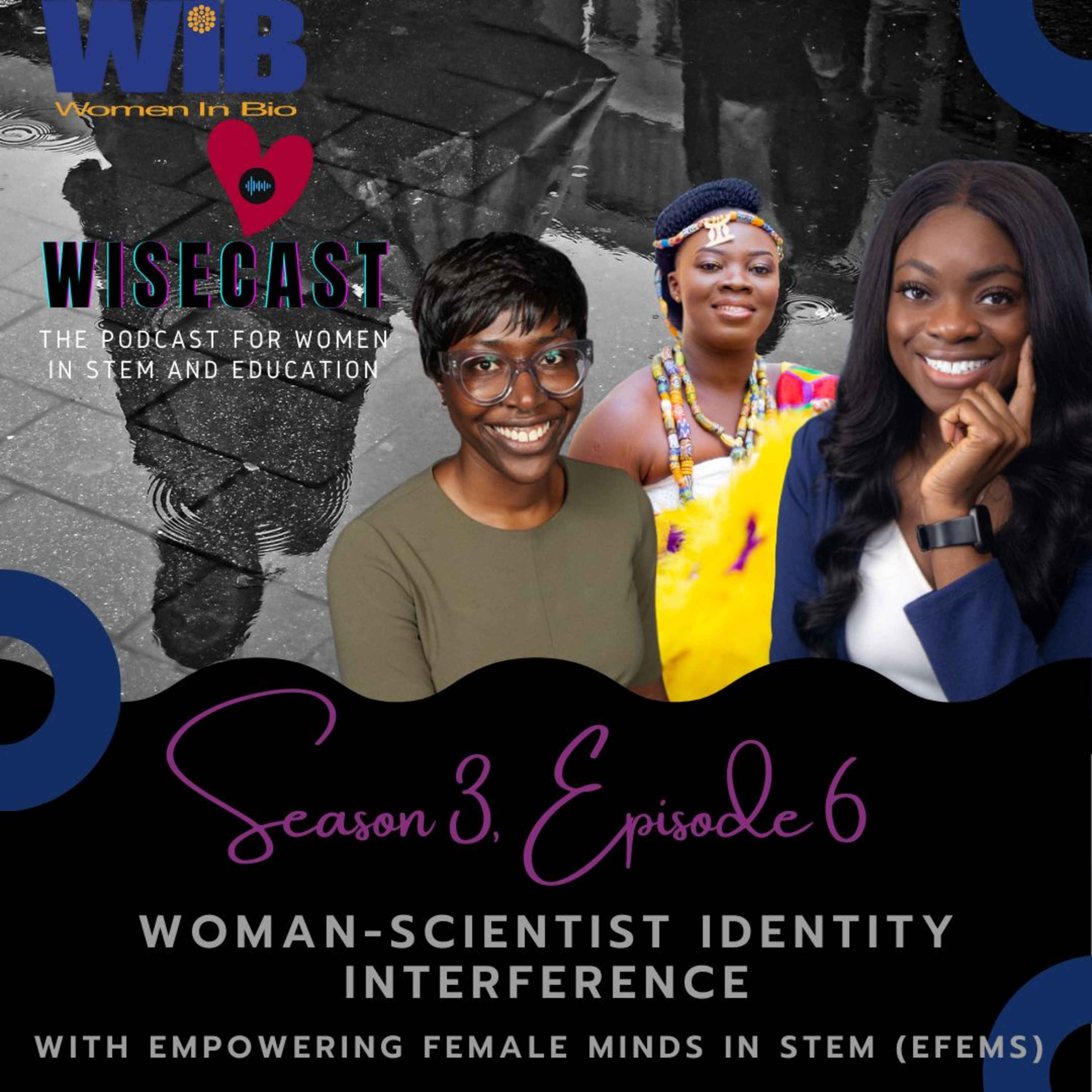
From episode one and counting, I have proudly hosted all our Postdoc Transformation Show episodes on Podbean. As a former IT strategy consultant, I have high requirements on my tech stack and Podbean is my perfect fit for a podcast host. If you want to create your own individual podcast or one for, you know, internal upskilling and communications within a company, DM or email me Podbean so I can share my experience and consult you. You can also use my affiliate links for perks, launching your own podcast with Podbean.
So, we are at the end of this episode, and I would love to have you, PostdocTransformers, to contribute to season four. We have a PostdocTransformation show newsletter where we inform about upcoming episodes, or we lay out the planning for the next seasons so that you are able to forecast who you want to ask as well as role models, or maybe you want to ask a couple of questions certain guest that is upcoming.
Hey, do you want to boost your PostdocTransformation and gain practical business experience? Click below to apply for a podcasting business internship with us!
And did you know that we offer deep dive e-course workshops and memberships at graduate schools? Maybe also at yours in the future. Ask your graduate school coordinator, whether they want to book my services so that I can deliver them to you 24 seven, 365 on your mobile device.
And even better, if you get us paid by your grad school, we will pay you 50 percent recurring sales commissions.
So, you will earn money with us as we help you and your PhD besties to [00:05:00] transition into business. We can build our PostdocTransformation together.

And now it's time to thank Company ABC who sponsors this episode of the PostdocTransformation Show. I will now be reading the company's answers to one of six bold [00:10:00] questions so that you can choose to apply. For example, number one, describe your most valuable experts versus leaders in your company.
Have they typically earned a doctor title? Number two, for whichever company roles or units do you encourage somebody with a doctor title to apply? Number three, how would you describe your organizational culture in which your most valuable experts and leaders thrive in? To nominate an employer of choice so that we can ask our own formative bold questions let us know via the click on the link.
If you are a company representative like in recruiting and employer branding. And now you want your company to be highlighted as an employer of choice for our audience. You can become a sponsor of a dedicated PostdocTansformation show episode. Just click the picture below and now back to the episode.

